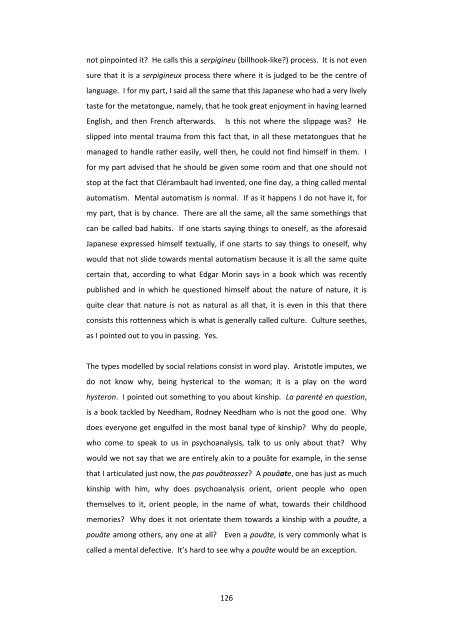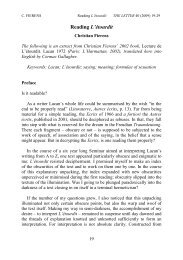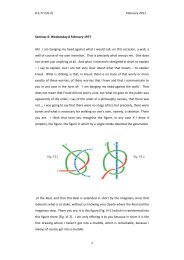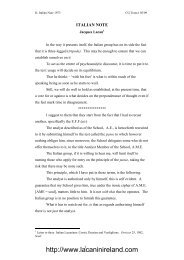Seminar XXIV Final Sessions 1 - Lacan in Ireland
Seminar XXIV Final Sessions 1 - Lacan in Ireland
Seminar XXIV Final Sessions 1 - Lacan in Ireland
Create successful ePaper yourself
Turn your PDF publications into a flip-book with our unique Google optimized e-Paper software.
not p<strong>in</strong>po<strong>in</strong>ted it? He calls this a serpig<strong>in</strong>eu (billhook-like?) process. It is not evensure that it is a serpig<strong>in</strong>eux process there where it is judged to be the centre oflanguage. I for my part, I said all the same that this Japanese who had a very livelytaste for the metatongue, namely, that he took great enjoyment <strong>in</strong> hav<strong>in</strong>g learnedEnglish, and then French afterwards. Is this not where the slippage was? Heslipped <strong>in</strong>to mental trauma from this fact that, <strong>in</strong> all these metatongues that hemanaged to handle rather easily, well then, he could not f<strong>in</strong>d himself <strong>in</strong> them. Ifor my part advised that he should be given some room and that one should notstop at the fact that Clérambault had <strong>in</strong>vented, one f<strong>in</strong>e day, a th<strong>in</strong>g called mentalautomatism. Mental automatism is normal. If as it happens I do not have it, formy part, that is by chance. There are all the same, all the same someth<strong>in</strong>gs thatcan be called bad habits. If one starts say<strong>in</strong>g th<strong>in</strong>gs to oneself, as the aforesaidJapanese expressed himself textually, if one starts to say th<strong>in</strong>gs to oneself, whywould that not slide towards mental automatism because it is all the same quitecerta<strong>in</strong> that, accord<strong>in</strong>g to what Edgar Mor<strong>in</strong> says <strong>in</strong> a book which was recentlypublished and <strong>in</strong> which he questioned himself about the nature of nature, it isquite clear that nature is not as natural as all that, it is even <strong>in</strong> this that thereconsists this rottenness which is what is generally called culture. Culture seethes,as I po<strong>in</strong>ted out to you <strong>in</strong> pass<strong>in</strong>g. Yes.The types modelled by social relations consist <strong>in</strong> word play. Aristotle imputes, wedo not know why, be<strong>in</strong>g hysterical to the woman; it is a play on the wordhysteron. I po<strong>in</strong>ted out someth<strong>in</strong>g to you about k<strong>in</strong>ship. La parenté en question,is a book tackled by Needham, Rodney Needham who is not the good one. Whydoes everyone get engulfed <strong>in</strong> the most banal type of k<strong>in</strong>ship? Why do people,who come to speak to us <strong>in</strong> psychoanalysis, talk to us only about that? Whywould we not say that we are entirely ak<strong>in</strong> to a pouâte for example, <strong>in</strong> the sensethat I articulated just now, the pas pouâteassez? A pouâate, one has just as muchk<strong>in</strong>ship with him, why does psychoanalysis orient, orient people who openthemselves to it, orient people, <strong>in</strong> the name of what, towards their childhoodmemories? Why does it not orientate them towards a k<strong>in</strong>ship with a pouâte, apouâte among others, any one at all? Even a pouâte, is very commonly what iscalled a mental defective. It’s hard to see why a pouâte would be an exception.126














